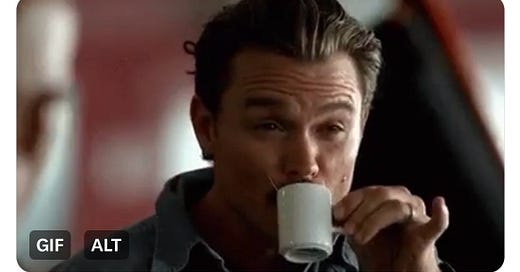I spend a lot of time in coffee shops. A lot. To the point that I instantly know by the decor if they’ll have a roast I like. I have a detailed ranking of the top baristas and what they do best (not everyone knows how to froth), and specific opinions about the seating in most popular spots. Some days, coffee shops are my main source of human interaction, but they are also great for eavesdropping.
And oh, the things I hear.
My buddy thinks I should write short stories about the characters I encounter. I definitely use them for dialogue/character inspiration, but there is not enough meat there for stories. Anecdotes, yes, but barely worth more than a tweet.
Real life, in and of itself, no matter how “crazy” the story is, doesn’t necessarily make for good fiction. Not unless you’re able to take that experience and put it through the lens of awareness first.
Real-life stories can make for great reading, obviously. Think David Sedaris or Anthony Bourdain or Tara Westover. But what makes their writing so compelling is they weave their own observations and insights into the storytelling. We see the story unfold through their eyes—through their senses—and they are able to artfully articulate how the events feel to them, in addition to how they are received by others.
They have reflected on what happened and then build around the story to make us experience the events more fully.
Same with a good documentary. It goes beyond “what happened” to show us the whole ecosystem of thoughts, people and histories that surround the event. There are interviews with family members. Insight from journalists and psychologists. There is also political context so that you understand why such an event could only happen at that particular moment in history.
It’s not just telling, “I live in this neighbourhood and here are some kooky characters.”
It’s showing that “I live in this neighbourhood that is special for the following reasons. And here are some kooky characters and an understanding of how they ended up here. And this is what happens when a new wave of people come in and change that ecosystem, etc.”

All the best writers I know possess a rich awareness. Perhaps a bit too much (again, “now I know why writers drink”). So chances are, you already have what you need to unpack the story you want to tell.
Challenge yourself to write more than a list of events that happened to you when you were 15. Ask, why do I want to tell this story? Why is it interesting? And how can I make the reader feel it too?




